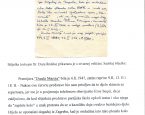This time the Time Capsule traveled to 1946, a tumultuous post-war year when the Rijeka theatre experienced ideological turmoil, as evidenced by a handwritten note.
The note was written by Dr. Đuro Rošić, the intendant of the “Ivan Zajc” National Theatre, a record of the fact that Držić’s drama “Dundo Maroje” had to be removed from the theatre’s repertoire after four performances due to a possible incident being prepared by the partisan school.
At that time, the debate raged over whether Marin Držić was just a comedian from Dubrovnik who good-naturedly ridiculed the vices of his contemporaries, or a conspirator as indicated by his letters to the Lord of Florence, Cosimo de’ Medici.
Đuro Rošić notes that he received a warning from Eros Sequi, a writer and one of the founders of the Italian Union, that the theatre could be surrounded in a similar manner to the Zagreb National Theatre a month earlier. The theatre had been surrounded to keep the Gotovac opera “Kamenik” from continuing, in protest against the libretto of Mark Fotez.
After our theatre presented this note by Đuro Rošić to the audience, the music critic Branimir Pofuk of Zagreb’s “Jutarnji List” revealed details of the scandal surrounding “Kamenik” in one of his articles (printed March 18, 2002). Pofuk specifically writes: “According to the recollection of Pero Gotovac, the composer’s son, as related by the Croatian musicologist Svanibor Pettan at the 1998 World Congress on Music and Censorship in Copenhagen, ‘At the third performance of Kamenik, in the middle of the second act, a group of young men in partisan unifroms, including armed men, began whistling, stamping their feet and howling the slogans “Down with the author!” and “Burn the notes!”’; According to the same memory, the archivist grabbed the notes and fled in one direction, and the author—who was also the conductor—fled the other way. After the successful action, the youths around the CNT building suddenly started singing and dancing the Kozarac circle.’” From that day until now, Kamenik fell into oblivion.
Follow us on our official Facebook page and other social media (Youtube, Instagram, Twitter). The online program “Zajc With You” continues publishing interesting theatre history through the “Time Capsule” program!
![]()
![]()


